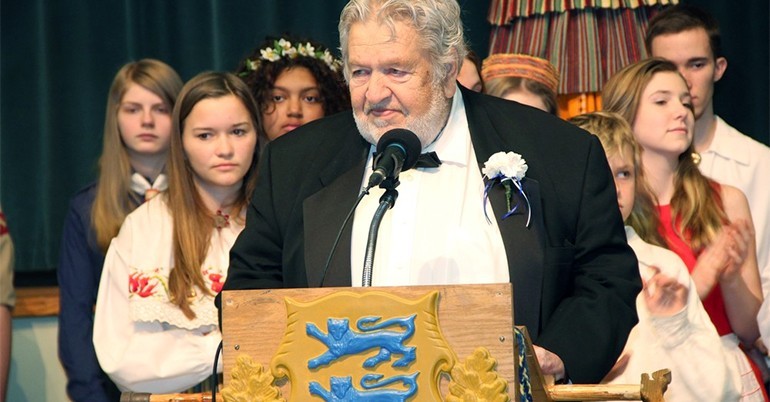Lives Lived: Laas Leivat Estonian Community Leader
March 15, 1941 in Hiiumaa -19. January 2024 in Toronto
Laas Leivat was a universally respected, compassionate and celebrated Canadian-Estonian community leader and a distinguished champion of Baltic freedom who will be remembered for his unwavering dedication to his community, his heritage and the principles of freedom and democracy.
Laas Leivat served as a singular beacon of hope and resilience for the Estonian diaspora and around the world.
Born in Käina, Estonia, on March 15, 1941, Mr. Leivat's early life was marked by the turmoil of World War II. At the tender age of three, he and his parents, Hella and Alfred Leivat, fled the Russian occupation of Estonia, finding refuge first in Sweden and then emigrating to Canada. This experience of displacement and resilience would come to define much of his life's work.
Leivat's life was committed to serving his community and the principles we fought for. His leadership in the Canadian-Estonian community was characterized by his intellect, balance, demeanour and dedication to sustaining Estonian national culture and identity in Canada and Estonian diaspora communities around the world. He was instrumental in establishing numerous Estonian organizations and cultural initiatives.
Leivat's outstanding advocacy for the freedom of the Baltic States was felt in Ottawa and capitals throughout the Western world. A persistent and effective critic of the Soviet occupation and colonization of the Baltic States, he played a pivotal role in mobilising support within Canada and beyond for the independence movements in Estonia, Latvia, and Lithuania. His tireless lobbying and articulate representation of the Baltic cause were instrumental in garnering international attention and support, contributing to the eventual restoration of independence to these nations. The impact of his contributions helped pave the way for Canada to become the first G7 nation to recognize the renewed independence of Estonia, Latvia and Lithuania in late August 1991.
Later that summer, Leivat was invited by Canada’s Minister of Foreign Affairs, Michael Wilson, to accompany him in a delegation to the capitals of Estonia, Latvia and Lithuania, where Canada became the first major industrialized nation to formally sign agreements to formally reestablish diplomatic ties with all three Baltic States, and cementing their status as free nations.
With Estonia’s freedom secured, Leivat set a new goal of achieving NATO membership for Estonia, Latvia and Lithuania. His advocacy, along with his Baltic colleagues in Ottawa, resulted in strong Canadian support for NATO membership - which was achieved in 2004.
Leivat served as a bridge between Canada and Estonia, enhancing bilateral relations and fostering mutual understanding. He was a trusted advisor, mentor and friend to many in the in the Canadian and Estonian political spheres - and at all levels of government- respected for his insight, integrity, and unwavering commitment to the principles of freedom and democracy.’
Through his regular Estonian Life newspaper columns and political advocacy for freedom and democracy, Leivat was a thorn in Moscow’s side throughout the Cold War and into the Putin era. In 2008 he was named to the Kremlin’s blacklist along with many prominent Estonian political leaders, including President Toomas Hendrik Ilves, and Prime Ministers Andurs Ansip and Mart Laar.
As we mourn the loss of Laas Leivat, we also celebrate his remarkable life and enduring contributions. His legacy will continue to inspire the Estonian Canadian community and all those who value freedom, justice, and the preservation of cultural heritage. His memory and achievements will forever be a guiding light for future generations.
Author:
Marcus Kolga
President Emeritus Estonian Central Council in Canada







